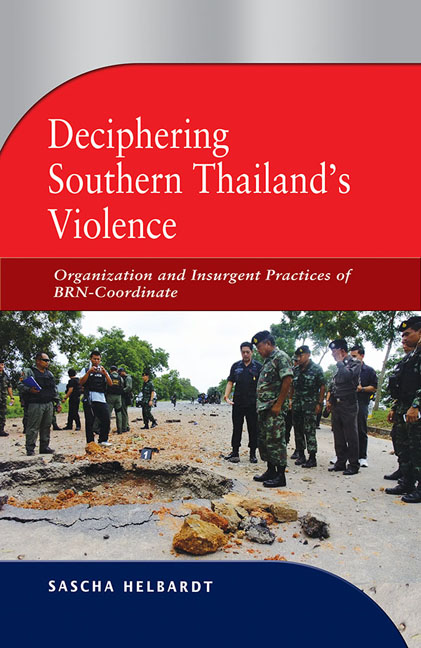Book contents
- Frontmatter
- Dedication
- Contents
- List of Figures
- List of Abbreviations
- Preface and Acknowledgments
- 1 Introduction
- 2 Organizational Aspects of BRN-Coordinate
- 3 Making Insurgents: Recruitment, Training and Control
- 4 Bringing the Actors Back In: Who Are the Insurgents?
- 5 Making Sense of Violence: Power and the Insurgency's Communicative Side
- 6 Conclusion
- References
- Bibliography
- About the Author
2 - Organizational Aspects of BRN-Coordinate
Published online by Cambridge University Press: 19 May 2017
- Frontmatter
- Dedication
- Contents
- List of Figures
- List of Abbreviations
- Preface and Acknowledgments
- 1 Introduction
- 2 Organizational Aspects of BRN-Coordinate
- 3 Making Insurgents: Recruitment, Training and Control
- 4 Bringing the Actors Back In: Who Are the Insurgents?
- 5 Making Sense of Violence: Power and the Insurgency's Communicative Side
- 6 Conclusion
- References
- Bibliography
- About the Author
Summary
Current popular understanding of violence has been influenced by the global political experience of an apparent rise in international terrorism, epitomized by the 9/11 attacks. This coincides with the “cultural turn” in the social sciences, which transformed understanding of violence given that it assumes that religion and ethnicity are self-explanatory categories for the motivation of violent acts, replacing the former “trendy” ideologies such as socialism or nationalism. Given these experiences, present-day terror is commonly believed to be undertaken in the name of God. These changes, coupled with the rise of the sociological concept of the network society, have given rise to paradigms such as “new wars” or “new terrorism”.
These paradigms not only alter our understanding of the goals and means of collective violence, but also of the organization of violence. In particular, the American way of framing terrorist threats as the “religionization of violence” goes hand in hand with the shift from a classical hierarchical organization of violence towards more ambiguous forms, such as loose networks, the “leaderless jihad”, or cellular organizations, whose rationality and sense of humanity are often questioned.
The “new terrorism” paradigm exerts a certain appeal when analysing violence in Southern Thailand, where terrorist attacks on civilians and state personnel are on the rise and the role of religious motivation is a hotly debated issue. Since 2004, terrorist groups have often neglected taking responsibility for violent attacks. Influenced by discussions about “new terrorism”, authors such as Pathan and Liow assume that separatist violence in Southern Thailand has adopted fundamentally new characteristics. Although both warn against exaggerating the concept of religious motivation (and international connections), stressing instead the role of local history as a motivating force for insurgents in Southern Thailand, they still propose that there is a rupture in the structural organization of the insurgency. In their analysis of the main insurgent organization in Southern Thailand, BRN-Coordinate, they argue that the key feature of this “new insurgency” is a low degree of organization.
In contrast, in this chapter I argue that although BRN-Coordinate has changed from BRN, its predecessor organization, largely in reaction to the successful counter-insurgency campaign of the Thai government, the group remains, at its core, a hierarchically organized group. In other words, the departure from the past is not as pronounced as some scholars argue.
- Type
- Chapter
- Information
- Deciphering Southern Thailand's ViolenceOrganization and Insurgent Practices of BRN-Coordinate, pp. 27 - 89Publisher: ISEAS–Yusof Ishak InstitutePrint publication year: 2014



